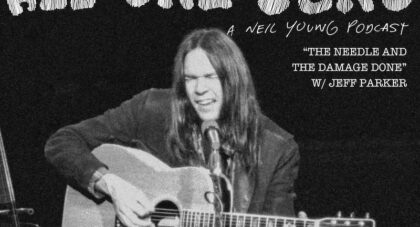In his tome It Came From Memphis, author Robert Gordon called Sid Selvidge the city’s “pre-eminent folkster.” Any argument to the contrary would likely be settled by one or two spins of The Cold of the Morning, Selvidge’s 1976 masterpiece.
The record recently has been reissued by Omnivore Records, produced by Sid’s son Steve Selvidge, of the rock & roll combo The Hold Steady. Under his Steve’s watchful eye, his father’s defining album is given a new opportunity to shine. And it shines: His voice is clear and present — sonorous but not affected or pretentious. His guitar work is stunning, its subtle picking demonstrating all the lessons Selvidge gleaned from Harry Smith’s Anthology of American Folk Music and bluesman Furry Lewis. Just to shake things up, Mud Boy and the Neutrons, helmed by Selvidge’s friend and compatriot Jim Dickinson, show up on a few tracks just to hint at the demented blues deconstruction Selvidge and Dickinson would help their friend Alex Chilton get up to.
Selvidge passed away nearly one year ago, in May of 2013. In his liner notes of the new edition of the record, Memphis-based writer Bob Mehr suggests that Cold of the Morning captures the “essence of the man.” Again — anyone looking to dispute should simply put the album on. Steve Selvidge took some time off from prepping for the release of The Hold Steady’s new record, Teeth Dreams, to discuss his father’s classic and his legacy.
Aquarium Drunkard: I want to start by stating that The Cold of the Morning -- just wow. This is a great record, man.
Steve Selvidge:Yeah it is.
AD: How did you hear it? Was it something your father played for you growing up, or was it something you discovered on your own?
Sid Selvidge: It came out when I was three. Early on it was just kind of “what dad did,” you know? I can remember my aunts and uncles playing it, being at my cousins’ house and it being on. And then you know, as I got older it was something I got into.
I’m not sure when it stuck out as being something special. It was just one of my dad’s albums, [but] like any great album, there’s a phase where it’s all you’re listening to. As I got to be in my 20s and stuff, I’d have big Cold of the Morning phases. We’d go back-and-forth talking about it. It was really toward the end of my dad’s life that it became, “Hey, wait a minute. This is ‘the’ record, this is the classic.” Kind of the focal point, I guess. [His] mortality being a part of it, you know? There wasn’t really a winding down [but in the twilight of his life] the context shifted, and it became very apparent where this record’s place was.
AD: That was the case for you and for him as well, right? Did he feel that Cold of the Morning was his classic as well?
Steve Selvidge: Yeah, I think so. He told me that. He certainly was fine with all his records; he put all of himself into them. But yeah, he felt that this was his best record, and certainly his clearest statement of who he was as an artist.
AD: It’s such an interesting record. The tracks with Mud Boy and the Neutrons [the loose cannon roots outfit Selvidge and producer Jim Dickinson performed with], the more unhinged tracks, are really fantastic, but then the rest of the record is sonically sparse. When you compare it to its contemporary records, such as Alex Chilton’s Like Flies on Sherbert, your dad’s sound captures the other side of the coin of that stuff. Whereas Big Star’s Third and Sherbert draw a lot of emotion out of a very chaotic sound, it feels like Cold of the Morning draws its power from a different place: It’s clean, it’s distilled.
Steve Selvidge: It’s much more elegant.
AD: Yeah, “elegant” is the exact word I’m fumbling for.
Steve Selvidge: It very much is the opposite side of the coin, because the record came out of his residency at the Procapé, and you’re talking about a musical roadmap that is Big Star’s Third. All that was contemporary. It’s interesting, because I’m going through all this stuff and doing a ton of tape transfers for those bonus tracks. A lot of these songs my dad had recorded versions of way early on. I’ve got a version of “Many a Mile,” which I’m assuming was cut by Don Nix around the time of the Portrait album on [Stax subsidiary] Enterprise in the late '60s. The version is pretty transcendent. It was a project of that environment that gave us Third. But it’s much more elegant. My dad was very determined with the way he did things. He was very much an academic, too. I don’t want to say it’s an immaculate record, because that makes it sound bookish or like it doesn’t have a soul, but he was very deliberate with the way he did things. So I think he crafted the record as such.
Only the good shit. Aquarium Drunkard is powered by its patrons. Keep the servers humming and help us continue doing it by pledging your support.
To continue reading, become a member or log in.


